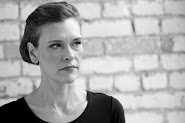In discussing women's poetry on a listserv. with all its attendant internet implications -- but in life, too -- I realize it's not wise to assume that "feminism" is at play just because it is women talking or that it's not because it's men; what is meant by feminism is our stories in relation to it and it in language.
I feel a social relief in mixed-gender poetry environments where though few people are discussing "feminism," all are inherently influenced by it and responding to it in their writing. "Feminism" is occurring between the lines. I'm thinking of one friend who said she found Isis-in-Genesis between the lines.
As feminists in college in Madison in the early 1980s, we were not allowed to read "the boys" or talk with men. Men, real men, all of them, were the enemy. I had just become an adult and had plenty of good associations with elder relatives, men and women as teachers in childhood, men at church; I had had mixed experiences with boys [related stories include "1974, What I Wanted" at fwriction : review and "Hysteria" at Camroc Review Press], and for that reason I was a feminist. Never to speak with or meet with men in our groups and to be suspicious of every male artist or writer because he was male -- the men I knew in college except one were gay -- affected life then and later. It was helpful to read women writers on my own, [...] but it was like being spayed for traditional life at 19 to hear the feminists' oral commands -- few in that rival-leftist environment felt free to have children or to shave.
[Mud! That paragraph is mud.]
I lived in a radical separatist commune when I was 20. It had been founded by Harold Groves as a first black sorority in the 1940s. Lorraine Hansberry lived there no later than 1950. In 1982, there were fourteen women -- bisexuality was not acknowledged in that setting though in practice it might have been taking place -- abortion was expected if anyone got pregnant. Rape was a common experience for many of the women, who formed non-monogamous unions before flitting on to the next "crush." Not one of the women (ages 19-38) said she wanted to marry a woman, not one. For me, not one long-term friendship formed or lasted beyond the co-op.
If it's true that fundamentalist Christianity took over the Republican and Christian agendas, is it the story that radical lesbian separatism took over the feminist agenda for a long time and then poof! there was no feminism, only post-feminism?
Was it anti-feminist to have children with a man? Or was it for zero population growth the separatists separated us? Was it religion in hiding? I realized later that there had been men who wanted "no-strings-attached" sex without the result being children. I learned that hippies' children were raised in the countryside like contraband. I realized that the hairy lesbians of the 80s were hippies. I still talk with women who were there who never had families, though they'd wanted families, who have sex with men, their affectional preference, who are not married (defined as a patriarchal institution).
Many instigators of separatism were middle-aged divorced professional women with children who had "come out." Later, even the word "lesbian" seemed to go by the wayside in preference for the word "gay." I've gathered that the left in general is relieved that gay men and women formed a coalition. I have had gay friends of both genders and hardly know what each of them thinks about gay marriage for him- or herself. Some advocates want the legal right to marry within their gender without wanting marriage.
[The right to marry another person, regardless of gender, represents an expansion of rights for all.]
Because of my initiation, I'm frankly quiet around contemporary discussions of feminism, but recently I've been asking. One white woman friend (a cw adjunct) spit out recently, "Black women hate white feminists." Snap! but the conversation ended there. She thinks she knows what I think I don't know about what feminism means to groups.
There was a great distinction then between lesbian street feminism and campus (academic) feminism that had partly to do with ethnicity (race) and class. The women's studies courses were superior -- the result of fine scholarship -- and the street ethics related to violence. In lesbian separatist S/M, violence was protected.
In the post-feminist world, due to my studies in women writers, I feel roots there and gravitate toward works by women poets and philosophers, though I have read as many men. [Insert list for skeptics of every book I've ever read and how I feel about it.] I've read and re-read Shakespeare or seen his works performed. Years of Shakespeare, yet what do I say about that creator's wife inheriting only his second-best bed? Or about the men's suicides, depressions, alcoholism, homosexuality or multiple marriages? I just found a bit of research at Salon.com about Sylvia Plath's menstrual cycles as the cause of her suicide, partly contesting an interpretation of her as manic-depressive.
Yes, jouissance -- I remember it; it happened to me in Irish bars with certain men. [What is the opposite of gender?]
I hear complaints about affirmative action from men in academic careers who believe their own careers -- including their publishing -- would have flourished without it. Though I won several incoming fellowships and kept high grades and published from 24 on, attended two Public Ivies and one privatized writing program within a public university setting, I landed zip. I volunteered as editor and teacher and lived with my mother for years. Yet I still read as if I were an academic insider. That poetry circles include wives and non-academics is a significant help.
[Notes added February 12, 2013.]
Subscribe to:
Post Comments (Atom)













No comments:
Post a Comment